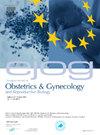Sleep quality in late pregnancy is associated with maternal mental health in the early postpartum period
IF 2.1
4区 医学
Q2 OBSTETRICS & GYNECOLOGY
European journal of obstetrics, gynecology, and reproductive biology
Pub Date : 2025-04-16
DOI:10.1016/j.ejogrb.2025.113980
引用次数: 0
Abstract
Objective
Several studies suggest an association between poor sleep quality during late pregnancy and postpartum depressive symptoms. However, so far no studies have comprehensively examined how sleep quality during pregnancy might impact overall mental well-being postpartum. This study aimed to investigate if sleep quality in pregnancy is associated with postpartum mental well-being, and/or with hormonal fluctuations, immune status, and parity.
Methods
We used data from 56 healthy women acquired in late pregnancy and five weeks postpartum. Sleep quality was assessed with the Pittsburgh Sleep Quality Index (PSQI), and mental well-being was measured with the World Health Organization Well-Being Index (WHO-5) as the primary outcome. Secondary outcomes included the Total Mood Disturbance (TMD) Score of the Profile of Mood States (POMS) and the Edinburgh Postnatal Depression Scale (EPDS) sum score. Blood samples for estradiol and high-sensitivity C-reactive protein (hsCRP) analysis were taken on the day of delivery and five weeks postpartum.
Results
We found a significant association between poor sleep quality in late pregnancy and lower levels of mental well-being five weeks postpartum (p = 0.02). Post hoc analyses showed a significant interaction with parity in this association (p = 0.016) such that multiparous women appeared more affected by poor sleep quality in late pregnancy. Sleep quality pre- and postpartum were highly correlated (p > 0.001). Meanwhile, hormonal and inflammatory markers did not significantly interact with sleep quality and postpartum well-being.
Conclusion
Sleep quality in late pregnancy is associated with maternal mental health early postpartum and this phenomenon appeared to be most pronounced for multiparous women.
妊娠后期睡眠质量与产后早期产妇心理健康相关
目的多项研究表明,妊娠后期睡眠质量差与产后抑郁症状有关。然而,到目前为止,还没有研究全面调查怀孕期间的睡眠质量如何影响产后的整体心理健康。本研究旨在调查孕期睡眠质量是否与产后心理健康、激素波动、免疫状态和胎次有关。方法采用56例妊娠晚期及产后5周健康妇女的资料。以匹兹堡睡眠质量指数(PSQI)评估睡眠质量,以世界卫生组织幸福指数(WHO-5)作为主要结果来衡量心理健康。次要结果包括情绪状态概况(POMS)总情绪障碍(TMD)评分和爱丁堡产后抑郁量表(EPDS)总分。分别于分娩当天和产后5周采血进行雌二醇和高灵敏度c反应蛋白(hsCRP)分析。结果我们发现妊娠后期睡眠质量差与产后5周心理健康水平较低之间存在显著关联(p = 0.02)。事后分析显示,这种关联与胎次有显著的相互作用(p = 0.016),因此,多胎妇女在怀孕后期受到睡眠质量差的影响更大。产前和产后睡眠质量高度相关(p >;0.001)。同时,激素和炎症指标与睡眠质量和产后健康没有显著的相互作用。结论妊娠后期睡眠质量与产后早期产妇心理健康状况相关,这种现象在多胎产妇中表现最为明显。
本文章由计算机程序翻译,如有差异,请以英文原文为准。
求助全文
约1分钟内获得全文
求助全文
来源期刊
CiteScore
4.60
自引率
3.80%
发文量
898
审稿时长
8.3 weeks
期刊介绍:
The European Journal of Obstetrics & Gynecology and Reproductive Biology is the leading general clinical journal covering the continent. It publishes peer reviewed original research articles, as well as a wide range of news, book reviews, biographical, historical and educational articles and a lively correspondence section. Fields covered include obstetrics, prenatal diagnosis, maternal-fetal medicine, perinatology, general gynecology, gynecologic oncology, uro-gynecology, reproductive medicine, infertility, reproductive endocrinology, sexual medicine and reproductive ethics. The European Journal of Obstetrics & Gynecology and Reproductive Biology provides a forum for scientific and clinical professional communication in obstetrics and gynecology throughout Europe and the world.

 求助内容:
求助内容: 应助结果提醒方式:
应助结果提醒方式:


